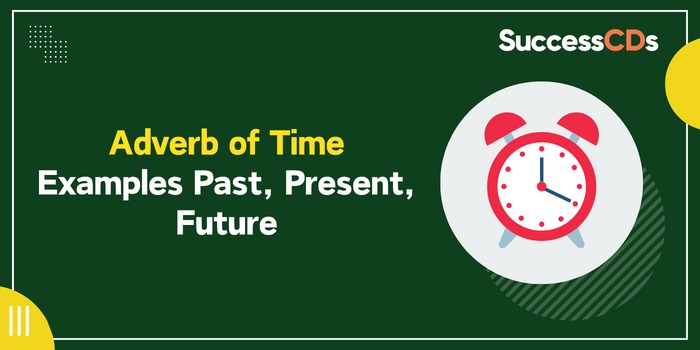
Navigating Time with Adverbs – Examples of Adverb of Time and their use in Example Sentences
With the help of our in-depth guide on adverbs of time, you may discover the secrets of efficient communication. Adverbs of time are used to specify the time of the happening or occurrence. As Adverbs tell us something more about the verb, adverbs of time tell us something more about the timing of the action. One must use time adverbs in sentences to be more particular about the exact occurrence of the event or incident. The below mentioned examples of adverbs of time can help you gain clarity about how to use adverbs of time in sentences. Students can get details of the various words which can be used as adverbs of time. We have added an exhaustive list of time adverb example sentences so that students can understand the usage of adverbs denoting time.
Examples of Adverbs of Time
Here’s a list of 50 examples of adverbs of time:
Now
Yesterday
Today
Tomorrow
Soon
Later
Early
Late
Always
Never
Already
Yet
Still
Recently
Lately
Often
Rarely
Sometimes
Frequently
Daily
Weekly
Monthly
Yearly
Once
Twice
Thrice
Before
After
Soon
Meanwhile
Afterwards
Immediately
Eventually
Presently
In the past
In the future
In the meantime
Suddenly
Unexpectedly
Gradually
Rarely
Seldom
Occasionally
Regularly
Periodically
Biweekly
Fortnightly
Quarterly
Annually
Hourly
Example Sentences using Adverbs of Time
25 examples of adverbs of time along with three example sentences for each:
Now:
She is teaching class 1 right now.
I can’t talk right now; I’m studying.
We should leave for the hospital now.
Later:
Let’s discuss the matter later.
I’ll call you later in the day.
You can finish the meal later.
Soon:
The class will start soon.
We’ll know the datesheet soon.
I’ll reach office soon.
Yesterday:
I visited the orphanage yesterday.
The launch happened yesterday.
We started the project yesterday.
Today:
Today is a cold, cloudy day.
I have a webinar later today.
What are your plans for today?
Tomorrow:
I have an appointment with the career counsellor tomorrow.
Let’s plan for tomorrow’s event.
Tomorrow is a holiday.
Early:
I slept early today.
The truck arrived early.
Can you finish the class early?
Late:
I worked late last week.
She arrived late to the class.
Don’t stay up too late.
Always:
He always arrives late.
She always criticizes others.
I always enjoy our outings.
Never:
I never eat spicy food.
He never misses my birthday.
She never gives me a gift.
Rarely:
I rarely go to the gym.
He rarely visits me.
We rarely have classes on Fridays.
Seldom:
Seldom do I watch cartoons.
They seldom accompany us.
Rain seldom falls in this region.
Sometimes:
I sometimes take the bus to office.
We sometimes go out for lunch.
She sometimes forgets her bag.
Weekly:
I meet my parents weekly.
We have a weekly magazine.
The garbage is not collected weekly.
Monthly:
The magazine is published monthly.
We have a monthly budget meeting in the office.
She pays her bills monthly.
Yearly:
The birth anniversary is celebrated yearly.
We conduct a yearly audit of all accounts.
I go for a medical checkup yearly.
Once:
I visited New York once.
She called me once only.
We meet once a week.
Twice:
We practise twice a week.
I went to the doctor twice.
He hit me twice yesterday.
Thrice:
I have been to Europe thrice.
She won the title thrice.
We meet thrice a day.
Daily:
I check my emails daily.
The newspaper is delivered daily.
She walks daily.
Hourly:
The train departs hourly.
I check my emails hourly.
The clock strikes hourly.
Biweekly:
We have biweekly team meetings.
She gets paid biweekly.
The school newsletter is published biweekly.
Fortnightly:
I receive updates fortnightly.
We have team lunch fortnightly.
She reviews progress reports fortnightly.
Quarterly:
The company reports financials quarterly.
We conduct performance audits quarterly.
The magazine releases a special edition quarterly.
Annually:
The awards ceremony is held annually.
We celebrate the anniversary annually.
The conference of investors takes place annually.
These adverbs of time can be used to add temporal details and enhance the clarity and precision of your sentences.Elevate your writing skills with practical insights and discover the impact of adverbs on your sentences.
Top
Also See :
- Antonyms Examples | Examples of Antonyms in English
- Adjectives Examples, Adjectives in Sentences Examples
- Adjectives of Quality Examples | Examples of Adjectives of Quality
- Abstract Nouns Examples| Example Sentences on Abstract Nouns
- Collective Nouns Examples| Examples of Collective Nouns
- Apostrophes Examples| Examples of Apostrophes
- Auxiliary Verbs Examples| Examples of Auxiliary Verbs
- Adverb of Manner List and Example Sentences
- Adverb of Frequency Examples
- Adverb of Degree Example Sentences
- Adverb of Quantity Examples| Examples of Adverb of Quantity
- 50 Affirmative Sentences – Examples of Affirmative Sentences
- Suffixes Examples | Examples of Suffixes in English
- Active and Passive Voice Example Sentences